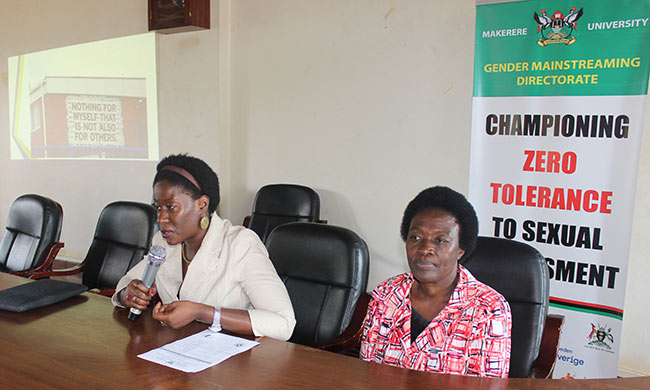Makerere University Gender Mainstreaming Directorate (GMD) has rolled out the Student Peer Trainers programme to train 250 students in handling gender issues as well as equipping them with knowledge and skills aimed at ending gender-based violence.
The Student Peer Trainers approach is one of the key strategies for implementing the Gender Mainstreaming Programme (GMP). The Student Peer Trainers programme targets all categories of Makerere University students. It is voluntary, based on expression of interest.
The training programme, to be conducted in cohorts, started on 28th March 2019 with the first cohort comprising 50 students who expressed willingness to participate in the programme. The first recruitment and training has been undertaken in partnership with the Uganda Association of Women Lawyers (FIDA Uganda) and the Uganda Women's Network (UWONET).
Representing the Director GMD, Dr. Euzobia Baine Mugisha, the Deputy Director, Ms. Frances Nyachwo said the Student Peer Trainers Program aims at creating a pool of trained champions with the capacity to reach out to their peers at Makerere University and beyond.
“This training prepares you to use the positive power of peer influence to promote respect and civility not only at Makerere University, but also in your communities. I urge you to carry on the skills you have gained to change the world and empower women and girls worldwide,” said Ms. Nyachwo.
She revealed that the Student Peer Trainers will also facilitate the wide dissemination of the referral system for students and victims to report any form of gender based violence.
“We expect student peer trainers to use the skills attained from this training to create awareness,
and train other students and the society at large about gender equality and equity. This will help to curb gender discrimination, sexual harassment and gender-based violence in society,” said Ms. Nyachwo.
Presenting the overview and objectives of the student peer trainers program, Ms. Suzan Mbabazi, the Principal Gender Officer, highlighted some of the objectives as follows;
- Getting knowledge on how to champion zero tolerance to sexual harassment especially at universities.
- How to end gender-based violence
- Understanding gender policies and concepts
- Appreciating women’s roles and promoting women empowerment
- Building gender equality in society
Ms. Mbabazi urged students to familiarize themselves with the Makerere University Gender Equality Policy to help them advocate for gender-responsive services.
Addressing the students, the Chairperson of FIDA Uganda-Mrs. Lydia Namuli Lubega said the issue of gender as well as ending gender-based violence is pertinent to them and central in their lives and operations.
“The issue of gender is part of FIDA Uganda through protecting women and girls, to curb the root causes of sexual harassment, gender-based violence, and gender discrimination,” she said.
Mrs. Namuli Lubega revealed that through this partnership, FIDA Uganda will work with Makerere University GMD, students and its partners to find solutions to the root cause of gender-based violence.
Eric Tumwesigye, Senior Gender Officer at Makerere University called upon the student peer trainers to work hand in hand with the Gender Mainstreaming Directorate to end social misconceptions about gender and empower women and girls.
“Let us put an end to the roles that hinder women transformation and guard against stereotyping to ensure that both men and women receive equal opportunities,” said Mr. Tumwesigye.
Written by: Esther Joyce Nakibombo, Volunteer, Mak Public Relations Office


 General2 weeks ago
General2 weeks ago
 Natural Sciences2 weeks ago
Natural Sciences2 weeks ago
 Agriculture & Environment1 week ago
Agriculture & Environment1 week ago
 General6 days ago
General6 days ago
 Health2 weeks ago
Health2 weeks ago



